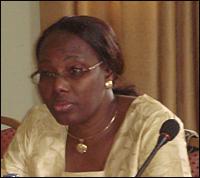Speech at the training workshop on blood donor recruitment: pre and post donation counseling
Addis Ababa, Ehtiopia
27 October 2008
The Head Health Services Provisional Department,
The Secretary General of the Ethiopian Red Cross,
The Country Director CDC, Ethiopia,
Dear Participants,
Ladies and Gentlemen.
The transfusion of blood is an age old, crosscutting therapeutic procedure used as a life saving intervention in all clinical disciplines. It is an indispensable component of health systems of all nations, saves millions of lives each year around the world particularly among vulnerable groups such as children and women of child-bearing age.
The provision of adequate and safe blood is vital in the efforts being made to achieve the 3 health related targets of the United Nations Millennium Development Goals, i.e. reduce child mortality, improve maternal health and combat HIV/AIDS, malaria and other diseases. Yet still when blood transfusion is not performed in accordance with set norms, standards and guidelines, there are potential risks of spreading transfusion transmissible infections such as HIV/AIDS, Hepatitis B, Hepatitis C, and causing transfusion reactions that could be life threatening.
One of the biggest challenges to blood safety and particularly in the developing world is accessing safe and adequate quantities of blood and blood products. Only 30% of the world's blood supply is available to the countries with low human development index although 80% of the world's population lives in these countries. Moreover these same countries are fraught with enormous disease burdens including HIV/AIDS which require blood transfusion for their treatment but also make it difficult to select donors at less risk of infection.
Lack of blood in hospitals is always unacceptable. The doctors and relatives of patients are faced with the awesome task of providing the badly needed unit of blood for their loved ones who in most cases are facing imminent death. The doctor also faces the obvious ethical dilemma of giving blood that may infect the patient, or not prescribing the blood and let the patient die. This task however places enormous pressure on the donor selection process which greatly compromises the safety of the blood supply. Relative replacement donors and syndicates of paid donors presenting as surrogate family members are common sources of blood in such circumstances. Reliance on these practices greatly jeopardizes the safety of the blood supply as they are known to carry higher risk of infection than voluntary non remunerated repeating blood donors.
Cognizant of these facts the WHO in its 28th World Health Assembly in 1975 adopted a resolution WHA 28.72 urging member states to establish nationally coordinated blood transfusion services based on an all voluntary donor base, to test all the blood supply against transfusion transmissible infections of public health importance and promoting the judicious and appropriate use of blood and blood products.
The WHO Regional Committee for Africa, through its resolution AFR/RC44/R12 in 1994, invited member states to take urgent measures to formulate and implement a policy on blood transfusion safety, mobilize resources for developing the infrastructure of the blood transfusion service of hospitals and set the objectives for the transfusion of blood uninfected by HIV.
One of the objectives of the Blood Safety Strategy of the African Region, which was adopted by the Regional Committee in its resolution AFR/RC51 R2 in 2001, was to assist member countries to set up an effective system of recruitment of low risk blood donors, with a target of collecting at least 80% of all blood donations from voluntary non remunerated blood donors by the end of 2012.
This target has been achieved by 19 of the 46 countries in the region, the collection ratio per 1000 of the population ranges from 0.3 to 34.7/1000. Selection of donors at reduced risk of infection still poses a challenge and prevalence rates of diseases transmissible through blood transfusion are still high among blood donors in some member states. There is therefore a lot to be done in the field of blood transfusion in general and blood donor recruitment in particular.
This workshop on voluntary donor recruitment, therefore gives us an opportunity to improve upon the required knowledge and skills to address not only the objectives of the resolutions but also to improve the safety of the blood supply and the quality of health care delivery to our people. The knowledge acquired will also put us in a better position to work towards attaining the vision and mission of our respective national blood services which is to provide adequate and safe blood and blood products to all in need.
The interventions required to do this are not difficult, the problems faced are not insurmountable let's therefore gear all our efforts towards attaining the target and addressing the backdrop with the commitment and force it deserves.
WHO remains fully committed in the provision of technical support to improve capacity in the National Blood Safety programs
Let me take this opportunity to welcome the external participants as well as those from the regions to Addis Ababa. Let me also wish you all a successful workshop.
Thank you




